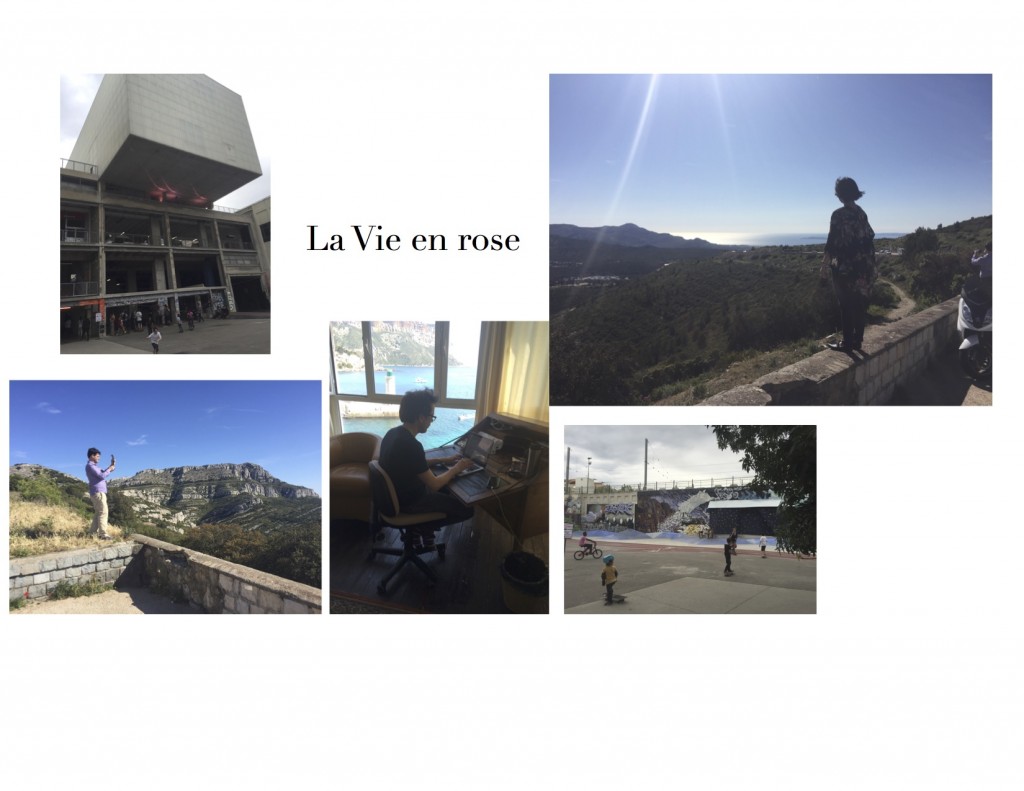
Marseille: May 2016
Matthew Gold
A few weeks ago, in late May, I was lucky enough to travel to France with Yuki Numata Resnick and Stephen Gosling to represent Talea at Le Festival Les Musiques 2016, a weeklong program of GMEM, the Centre National de Création Musicale in Marseille. As a trio we presented two concerts on the festival, including a collaborative program with composer Pierre Jodlowski named for his new work for Talea, This Leads to an Emotional Stasis. Upon arrival in Marseille we immediately found ourselves in the middle of an extraordinary flurry of creativity, musical energy, urban vitality, and natural beauty. The festival itself presented a panoramic view of the new and adventurous music currently being produced in France, and Europe in general, with numerous daily events at a range of venues showcasing Marseille’s continuing engagement with its industrial legacy.
After presenting an acoustic concert on our first full day in Marseille at the new Théâtre Joliette-Minoterie on the city’s waterfront, we moved into GMEM’s headquarters for several full days of intense rehearsals with Pierre and his artistic partner and technical director François Donato. For all of us this was an incredibly rewarding interaction in which we spent hour after hour digging into this large-scale new work involving music, movement, electronics, and lights. The result was a fully integrated evening-length program including two works by Pierre, and music by Jesper Nordin and Alvin Lucier. The premiere, This Leads to an Emotional Stasis was a powerful and moving work that explored fascinating new areas of electronic and acoustic interaction while pushing the performers, which is to say us, beyond our usual comfort zones.
Of course after long days of intense rehearsal it was a pleasure to return each evening to Cassis, where we were housed on the grounds of the Camargo Foundation. Each day in Marseille someone from the festival would ask if we were enjoying our stay in heaven, usually with a touch of sarcasm. But it would be hard to argue with that characterization. We stayed in rambling, high ceilinged apartments with large windows opening onto balconies that hover directly above the Mediterranean thirty or so feet below. To the left one could take in the town’s famous cliffs, and to the right the calanques. Steve’s suite was even graced with a white piano, or so it seems in my recollection.
On the day of the Jodlowski concert we gathered at the central venue for the festival, Friche la Belle de Mai, the site of our final concert. I was especially excited to be performing here as I had visited the complex several years earlier while travelling with my family, and I was intensely curious to get another, deeper look at it. La Friche, as it is known, is a former tobacco factory in the neighborhood of Belle de Mai that was converted into a cultural complex in 1992. Described as an artistic and urban experimentation zone, the sprawling complex features an open layout and is the home of numerous cutting edge cultural institutions in Marseille. It includes performance and exhibition spaces, bookstores, a café, the restaurant Les Grandes Tables, radio broadcast facilities, and so on. The scale of the place is remarkable. More importantly though I found La Friche to be open to the surrounding neighborhood in a way I have rarely encountered elsewhere. The complex is directly integrated with its neighborhood and seems to be inviting to all. There is constant activity throughout its grounds with an active skate park and playground, community farming, an onsite preschool, and a general sense of shared ownership of the space. Urban experimentation is part of La Friche’s mission, and going forward it is planning to open a collaborative housing project and launch other such ventures. While such projects, and similar goals, can be found in many locations, including in the U.S., at La Friche I sensed a comprehensive engagement with the community that felt unique. I had the sense that real, daily life is carried out on the grounds of La Friche and a deep exchange is occurring between its social and artistic components. GMEM itself will be relocating to La Friche in early 2017 and will be the first full-time center for contemporary music and composition at the complex. In addition to gaining a state of the art center for avant-garde music it should be an opportunity for an extraordinary organization, GMEM, to become more deeply enmeshed in its immediate community.
Of course all of these observations are the product of a couple days spent at La Friche and can only be considered to be first impressions. With that in mind, and somewhat selfishly, I hope that Talea will have many more opportunities to collaborate with GMEM and to see more closely how things develop at its new home.
